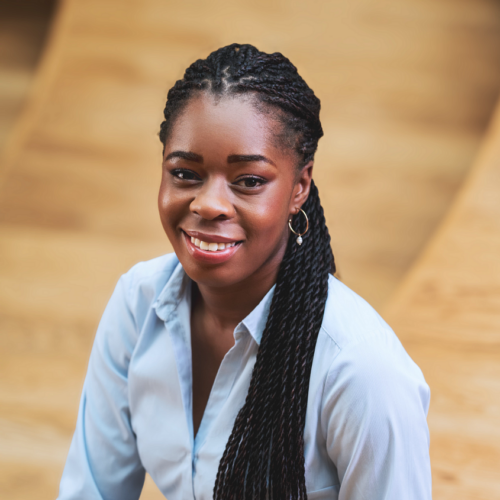Stephanie Mbida leads no ordinary life. At age 14, she had already graduated high school and would spend the next four years of her life traveling her parents’ home country of Cameroon to advise world leaders on social issues.
Prior to this, the Olin Business School MBA candidate says “New York was all [she] knew,” noting that she grew up “incredibly poor” in the South Bronx.
However, financial concerns did not stop Stephanie’s mother from sacrificing her career to devote herself to homeschooling her intellectually advanced daughter, who showed a proficiency for physics at age seven. “When I think about what I want to do in life, one of the biggest motivators for me is to honor my mother’s sacrifice, because I know it took a lot for her to make that choice,” Stephanie says.
Indeed, it was a choice that significantly shaped Stephanie’s future. First, it enabled her to complete her schooling on an accelerated path and become an advocate for Cameroonian youth and women when her parents moved their family back home. There she interacted with all levels of Cameroonian society, from homeless children to the country’s first lady, even as a teenager. In turn, these unique experiences helped her gain a scholarship to attend Northwestern University, where she earned a bachelor’s degree in economics and French.

Growing up in poverty never dampened Stephanie’s expectations of what she could become or accomplish; rather, she took pride in the unique multicultural perspective she had to offer. As she assessed her next move after Northwestern, she found herself drawn to Olin Business School at WashU for its emphasis on values-based leadership and a global approach to business education.
“I wanted to be in an environment where I would be challenged to learn more about other cultures and other ways of approaching the business environment,” she says. “But I also wanted to be in a place where I felt my experience as someone of multicultural descent would also be valued.”
At Olin, Stephanie has found this welcoming and inclusive community, and the financial stability afforded by her scholarship has given her the space to continue growing and developing her identity as an individual and as a professional.
“Being at WashU, at Olin, has offered me the opportunity to learn so much more about myself,” she says. “Because of that growth, I’ve been able to become a better worker, a better teammate, a better classmate. I’m more conscious of how I exist in an environment, and how my individual actions affect other people around me.”
“Being at WashU, at Olin, has offered me the opportunity to learn so much more about myself,” she says. “Because of that growth, I’ve been able to become a better worker, a better teammate, a better classmate.
Stephanie Mbida, MBA ’23
One highlight of Stephanie’s experience is the course, “Strategic and Crisis Communications,” where she and a team of students had to manage a crisis scenario in real time, a task she describes as the “definition of experiential learning.” Stephanie was able to dive into this immersive learning experience without reserve, making the most of the highly intense weekend and gaining an understanding of the nuances of skillful crisis response.
Going forward, Stephanie hopes to gain more experience with microfinancing and marketing. “I’ve always been very passionate about issues of poverty, and I think financial liberation and financial empowerment are key stepping stones toward creating more equity in the world,” she says. “For this reason, I would like to get into microfinancing for small business owners and minority populations.”
Last summer, she made progress on her goal of serving historically underrepresented groups by working as an intern for The Central Bank of Cameroon. Shadowing the bank’s executive board, she learned how the country is assigned its debt rate and what steps various organizations are taking to improve this rating.
As she prepares to take what she’s learned at Olin and apply it in the workforce, Stephanie remains grounded in her roots, including her mother’s courageous sacrifice. To future WashU students, she says, “Own every aspect of your story, from beginning to end,” adding, “I hope to be one of many more examples of the ways in which, just because you grew up a poor child in environments telling you you’re not worth much, doesn’t mean you can’t aspire to achieve some of the greatest things and access some of the greatest opportunities the world has to offer.”
You can support future leaders like Stephanie create a brighter future with a gift of any amount for WashU graduate scholarships and fellowships.